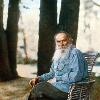

Reverted to version as of 0214, 27 September 2008 Topics: Entertainment Tags: Leo Tolstoy View |
Tags: Leo Tolstoy View |
Tags: Leo Tolstoy View |
|||||||||
Leo Tolstoy, or Count Lev Nikolayevich Tolstoy (audio-ru?e? ??????????? ????????Ru-Lev Nikolayevich Tolstoy.ogg, IPA-rul?ov n??k??la?v??t? t?l?stoj; OldStyleDateSeptember 91828August 28 - OldStyleDateNovember 201910November 7), was a Russian writer widely regarded as among the greatest of novelists. His masterpieces War and Peace and Anna Karenina represent in their scope, breadth and vivid depiction of 19th-century Russian life and attitudes, the peak of realist fiction (literary realism).
Tolstoys further talents as essayist, dramatist, and educational reformer (Education reform) made him the most influential member of the aristocratic Tolstoy family. His literal interpretation of the ethical teachings of Jesus, centering on the Sermon on the Mount, caused him in later life to become a fervent Christian anarchist (Christian anarchism) and pacifist (Christian pacifism). His ideas on nonviolent resistance, expressed in such works as The Kingdom of God Is Within You, were to have a profound impact on such pivotal twentieth-century figures as Mahatma Gandhi (Mohandas Karamchand Gandhi) and Martin Luther King, Jr.
Date of birth: 1828-09-09
Birth Location: Yasnaya Polyana, Russian Empire, Russia
Date of death: 1910-11-20
Death Location: Lev Tolstoy (settlement), Astapovo, Russian Empire, Russia
Occupation: Novelist
Genre: Realist (realism (arts))
Political Movement: Christian anarchist (Christian Anarchism),pacifist (Pacifism)
Notableworks: ''War and Peace'',''Anna Karenina''
Influences: Petr Chel?ick�, Aleksandr Pushkin, Laurence Sterne, Harriet Beecher Stowe, Charles Dickens, Plato, Aristotle, Jean-Jacques Rousseau, Arthur Schopenhauer, Nikolai Vasilievich Gogol, the Bible, Henry David ThoreauCitation neededdate=August 2008
Influenced: Muhammad Iqbal, Mohandas Gandhi, Martin Luther King, Jr., Virginia Woolf, Anton Chekhov, Marcel Proust, Thomas Mann, William Faulkner, Orhan Pamuk, Ludwig Wittgenstein, James Joyce, Vladimir Nabokov.



